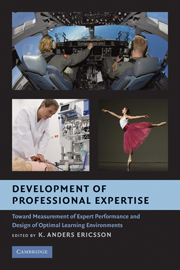 Development of Professional Expertise
Development of Professional Expertise Book contents
- Frontmatter
- Contents
- List of Figures
- List of Tables
- List of Contributors
- 1 The Measurement and Development of Professional Performance: An Introduction to the Topic and a Background to the Design and Origin of This Book
- SECTION 1 CHALLENGES IN PAST AND CONTEMPORARY EFFORTS TO MEASURE AND TRAIN THE OBJECTIVE PERFORMANCE OF PROFESSIONALS
- 2 The 20th-Century Revolution in Military Training
- 3 Developing Professional Expertise with a Cognitive Apprenticeship Model: Examples from Avionics and Medicine
- 4 Leadership Development and Assessment: Examples from Avionics and Medicine
- 5 Revolutions, Leaders, and Diagnosticians: Reflections on the Themes in Chapters 2–4
- SECTION 2 PAST AND CONTEMPORARY EFFORTS TO DESIGN INSTRUCTION, TRAIN, AND MAINTAIN PROFESSIONAL PERFORMANCE
- SECTION 3 THE ASSESSMENT AND TRAINING OF SKILLED AND EXPERT PERFORMERS IN THE MILITARY
- SECTION 4 THE DEVELOPMENT OF EXPERTISE AND EXPERT PERFORMANCE
- Name Index
- Subject Index
- References
3 - Developing Professional Expertise with a Cognitive Apprenticeship Model: Examples from Avionics and Medicine
Published online by Cambridge University Press: 04 August 2010
- Frontmatter
- Contents
- List of Figures
- List of Tables
- List of Contributors
- 1 The Measurement and Development of Professional Performance: An Introduction to the Topic and a Background to the Design and Origin of This Book
- SECTION 1 CHALLENGES IN PAST AND CONTEMPORARY EFFORTS TO MEASURE AND TRAIN THE OBJECTIVE PERFORMANCE OF PROFESSIONALS
- 2 The 20th-Century Revolution in Military Training
- 3 Developing Professional Expertise with a Cognitive Apprenticeship Model: Examples from Avionics and Medicine
- 4 Leadership Development and Assessment: Examples from Avionics and Medicine
- 5 Revolutions, Leaders, and Diagnosticians: Reflections on the Themes in Chapters 2–4
- SECTION 2 PAST AND CONTEMPORARY EFFORTS TO DESIGN INSTRUCTION, TRAIN, AND MAINTAIN PROFESSIONAL PERFORMANCE
- SECTION 3 THE ASSESSMENT AND TRAINING OF SKILLED AND EXPERT PERFORMERS IN THE MILITARY
- SECTION 4 THE DEVELOPMENT OF EXPERTISE AND EXPERT PERFORMANCE
- Name Index
- Subject Index
- References
Summary
One of the greatest challenges of assessment in the professions is the higher consequence of errors. In classrooms, there is a consequence to the individual learner if assessment errors are made, but the impact of such errors may not have large-scale consequences. However, when we certify trainees – be they in the military, in medicine, or professions in general – there can be consequences if the measures of proficiency are inadequate. Valid measures take on new meaning when the risks of improper; assessments could endanger people's well-being. This paper will address the techniques used in the design and evaluation of Sherlock, an avionics tutor used by the U.S. Air Force to train technicians to troubleshoot problems pertinent to the F-15 aircraft (Lajoie & Lesgold, 1992a; Lesgold, Lajoie, Bunzo, & Eggan, 1992; Lesgold, Lajoie, Logan & Eggan, 1990). Sherlock presented airmen with realistic fault-isolation problems, similar to those they encounter when troubleshooting avionics equipment. The Sherlock trainees demonstrated improvements in their troubleshooting skills on a variety of measures, taken by Sherlock as training proceeded and via a post-training performance test (Lesgold et al., 1990 Lesgold et al., 1992 Nichols, Pokorny, Jones, & Gott, et al., in press). An analysis of Sherlock will be provided in terms of “what worked” or “lessons learned.” Applications of these methods and extensions to these techniques are also provided for another domain, medical problem solving (Lajoie, 2007).
- Type
- Chapter
- Information
- Development of Professional ExpertiseToward Measurement of Expert Performance and Design of Optimal Learning Environments, pp. 61 - 83Publisher: Cambridge University PressPrint publication year: 2009
References
- 60
- Cited by


